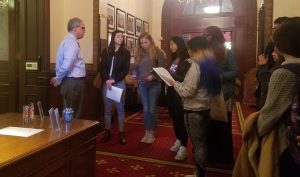Georgetown Library and the Gelardin New Media Center hosted a lecture on the role of virtual reality (VR) in healthcare in Lauinger Library on Oct. 1. Three speakers presented, and the event concluded with a hands-on demonstration of new VR technology the library has acquired. Both undergraduates and faculty were in the audience, in addition to some who live streamed the lecture.
Keynoting the event was Dr. Susan Persky, director of the Immersive Virtual Environment Testing Area (IVETA) as part of the National Institutes of Health. She was joined by Dr. Evan Barba, an associate professor of design and technology for graduates at Georgetown, and Dr. Kenneth Tercyak, a professor at Georgetown’s School of Medicine.
Barba began the event with a brief introduction into “XR,” or cross-reality. According to Barba, XR represents the range of “cognitive experiences” someone can have, ranging from—but not limited to—completely physical to completely virtual environments.
“Really we’re talking about the experiences that you can have around these technologies and how you can mix them together to create a blend of your physical and virtual surroundings,” Barba said.
When asked if games like Pokemon GO would apply, Barba said that he definitely thought so. “It’s an amazing example of how we can be operating at all these different scales at the same time,” he said. “And that’s sort of the holy grail for a lot of these experiences”
Perksy gave some specific examples from her time at the IVETA on how VR can be used in research, medical practice, and training experiences. Despite some concerns that VR would have a hard time eliciting realistic responses, Perksy said this wasn’t much of an issue.
“In a virtual reality environment, you get a very strong sense of psychological realism,” she said. “We really feel like we are in this virtual reality world.”
One application given by Perksy was in reducing fear from trauma, for example, a fear of flying. While it’s impractical to buy multiple flights to help reduce this fear, she explained, VR can help a patient gradually become more comfortable.
“Doing desensitization training in some fields can be really difficult and really expensive,” Perksy said. “Using VR can allow people to have ground exposure to these fear events.”
In addition to replicating reality, Perksy argued that the precision in measurement offered by VR was another advantage, allowing researchers to get direct data on someone’s experiences rather than relying on questionnaires or testimony.
Tercyak spoke about his experience teaching the senior seminar “Mindfulness for Health.” In that class, Georgetown students integrated VR into meditation techniques to try and reduce stress. Terycak’s class used the Oculus Quest, one of the newest VR sets which is also now available for use by all Georgetown students and has promise far beyond the classroom.
“This has to be part of our national conversation on things like the opioid crisis,” Tercyak said. ”So that when you are affected by an affliction that does involve pain management, that [opioids] aren’t the first medication.”





